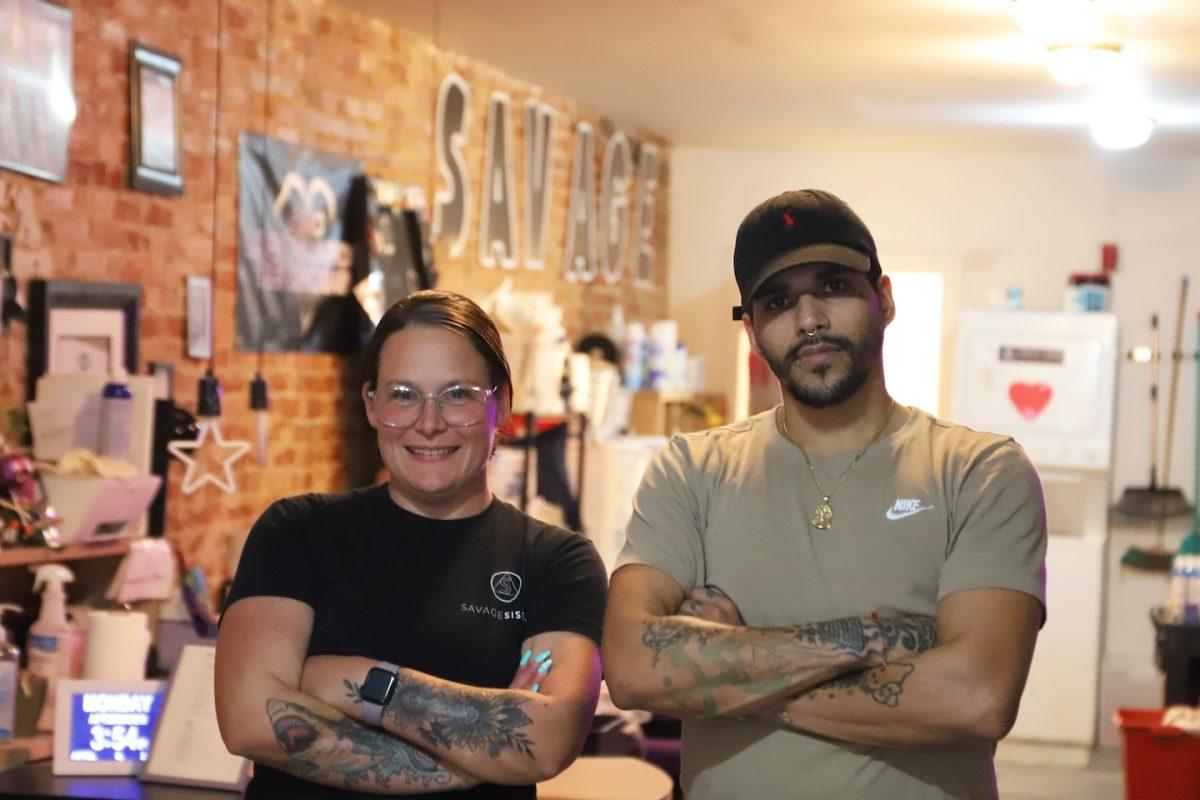Underneath the rumble of the Market-Frankford Line’s Allegheny station, a small nonprofit that engages face-to-face with the beleaguered Kensington community at the epicenter of Pennsylvania’s opioid epidemic is facing a battle of its own.
Founded in 2018 by Sarah Laurel, Savage Sisters Recovery offers harm reduction-focused care for those facing substance abuse disorders at their 3115 Kensington Ave. storefront.
Harm reduction is an evidence-supported approach to substance use disorders that focuses on keeping people who use drugs as safe as possible until they can willingly seek rehabilitation.
Founded and run largely by people who have experienced substance use disorders and homelessness in Kensington, Savage Sisters’ staff members pride themselves on engaging with and relating to anyone who comes into their storefront. Their free services include wound care, showers and a warm place to rest during cold Philadelphia winters. Substance use is not permitted on the premises.
In 2022, Philadelphia had a record-high 1,413 deaths from unintentional overdose. In 2023, Savage Sisters reversed over 300 overdoses.
“We spend a lot of our time convincing everyone that we’re worth saving,” said Melanie Beddis, programs director at Savage Sisters. “People who use drugs are worth saving.”
But the storefront will not be saved. Shift Capital, the building’s owner, informed Savage Sisters Feb. 13 their lease would not be renewed past Sept. 30.
When asked about the decision to not renew the lease, Brian Murray, CEO of Shift Capital, wrote in response to written questions from The Hawk: “This is not an eviction notice as it has been publicly miscategorized. We provided the not to renew notice to Savage Sisters in February so they had eight months to plan their next steps. We understand that time to plan, organize and collaborate is essential to organizations as they navigate space changes.”
Beddis said the owner’s decision is indicative of citywide neglect of harm reduction in Kensington.
“The city just considers harm reduction as distributing Narcan and it’s so much more than that,” Beddis said. “A shower is considered harm reduction. Wound care is considered harm reduction. And what we’re really advocating for is to show that harm reduction is public health.”
‘It seems like we’re just under siege’
Shift Capital’s decision came amidst criticism of Savage Sisters from the Philadelphia City Council’s Kensington Caucus, consisting of councilmembers Mike Driscoll, Jim Harrity, Mark Squilla and Quetcy Lozada, the most vocal critic of Savage Sisters.
The Kensington Caucus released a statement Feb. 16 on Shift Capital’s decision not to renew the lease, stating, “In recent conversations with members of the Kensington community, we heard overwhelmingly positive feedback about the prospect of certain organizations no longer operating on Kensington Avenue.”
The statement continued, “This neighborhood can no longer be the home of an open-air drug market nor the organizations that encourage the market to thrive.”
Murray said Shift Capital’s decision not to renew the lease was based on property evaluation and feedback from neighbors over the past two years, not any pressure from Lozada or the Kensington Caucus.
“We remain supportive of community-minded organizations, residents, families and businesses that deserve holistic solutions to the health and humanity crisis in Kensington,” Murray said.
But for Beddis and others at Savage Sisters, Shift Capital’s decision seems to neglect all of the work Savage Sisters has done for the Kensington community.
“Over the last year and a half, we’ve worked really hard to get this place to where it is today,” Beddis said, “to come up with standard operating procedures, to help as many individuals as possible. I also feel like especially over the winter, we were filling a large gap that the city left and just providing shelter during freezing temperatures. So to not be recognized for any of that and just have the door slammed in our face is hurtful.”
Beddis added that Savage Sisters is not to blame for Kensington’s notorious open-air drug market, an area defined as having few barriers to selling and purchasing drugs. Kensington is one of the largest open-air drug markets in the United States.
“Kensington is a government failure. We are not the reason that Kensington is the way it is,” Beddis said. “It was a containment strategy. It was successful.”
Beddis said over the past decade, the open-air drug market has been pushed from Huntington and Somerset stations to further northeast along the Market-Frankford Line.
“We’ve watched it get pushed up to Allegheny [Station], a lot of the sex workers got pushed up to Tioga [Station], so that’s all that keeps happening,” Beddis said. “They just keep scooting everybody down.”
Jose Castillo, a harm reduction specialist at Savage Sisters, said Philadelphia currently has a hostile attitude towards all harm reduction providers in Kensington.
“Right now, it seems like we’re just under siege,” Castillo said.
‘No comprehensive planning from anyone’
In a Feb. 23 interview with “Good Day Philadelphia,” Lozada said the Kensington Caucus’ goal is not solely to arrest people. But Castillo said the neighborhood already feels an increased police presence.
“People have been getting cleared out from the ‘ave,’ and it’s just cops and a trash truck, throwing all people’s stuff away and telling them to move along,” Castillo said. “I don’t know where that’s coming from, but it’s definitely something different, and a lot of the people that come in here are letting us know that the presence is already felt.”
Joe Kelly ’24, who performs wound care in Kensington with Mother of Mercy House through one of St. Joe’s health promoter programs, said heavy-policing strategies make sense to people disconnected from the problem of substance use disorders in Kensington, but he disagrees with these strategies.
“I think that’s a very disconnected and dehumanistic approach to it,” Kelly said.
Philadelphia Mayor Cherelle Parker announced March 14 she would invest $100 million for “triage and wellness facilities” in her five-year financial and strategic plan. Parker has stated Philadelphia needs several of these facilities, but has not yet indicated where they would be located.
Parker also announced an end to city funding of needle exchange programs, another aspect of harm reduction meant to decrease HIV rates in Philadelphia.
Peter Clark, SJ, Ph.D., director of Catholic bioethics at St. Joe’s Institute of Clinical Bioethics, said removing harm reduction services would not help Kensington’s already vulnerable population, especially given the increasing prevalence of xylazine, or “tranq,” a horse tranquilizer, in Kensington’s drug supply. Xylazine can cause burn-like wounds and unlike heroin or fentanyl, the effects of a xylazine overdose cannot be reversed with naloxone, the medication in Narcan.
“What is your plan to pick up the slack for what [harm reduction services] do?” Clark said. “I’ve heard no comprehensive planning from anyone.”
In a March 26 city budget hearing, Adam Thiel, Philadelphia managing director, said, “the vision for these triage and wellness centers is really bold and obviously backed by an unprecedented proposed investment.”
“We are looking at ensuring that we have facilities where we can triage folks who need city services, who are currently experiencing a lot of different types of ills, whether that’s temporarily experiencing homelessness, whether it’s substance use disorder, and ensuring that we are able to wrap around those folks and get them the help they need,” Thiel said during the hearing.
Theil added the specifics of this “very bold plan are still under development.”
“We are doing due diligence and a number of different possibilities and also talking with a number of different providers about how we’re going to staff these facilities,” Theil said during the hearing.
Castillo said Savage Sisters hasn’t received any specific information from the city about the triage facilities.
“I can’t say I have hope for it because we’re not involved,” Castillo said.
Beddis said once their lease expires in September, Savage Sisters plans to go mobile, operating out of a shower-equipped van to continue street-level engagement.
But the city’s attitude towards harm reduction services leaves a grim future for Pennsylvanians with substance use disorder, Beddis said, especially in Kensington.
“More people are definitely going to die,” Beddis said.

















































